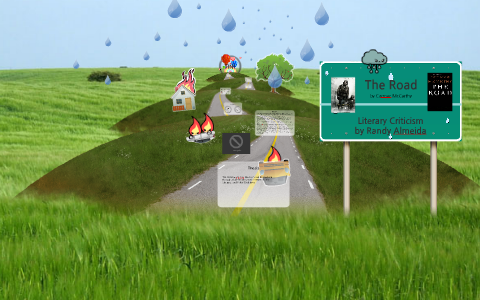The Road is a post-apocalyptic novel by Cormac McCarthy, published in 2006. It tells the story of a father and son who are trying to survive in a world that has been devastated by an unspecified disaster. As they travel through a landscape that is filled with danger and despair, they must confront both the physical challenges of their environment and the psychological challenges of their own troubled relationship.
One of the most striking aspects of The Road is its bleak, desolate setting. McCarthy paints a vivid picture of a world that has been ravaged by some unknown cataclysm, leaving behind a landscape that is barren, polluted, and filled with danger. The father and son are forced to scavenge for food and supplies in a world where resources are scarce and competition is fierce. They are constantly on the move, traveling south in the hope of finding a safer place to live.
Despite the bleakness of the setting, however, The Road is not a nihilistic novel. Rather, it is a meditation on the resilience of the human spirit and the power of love and hope in the face of unimaginable adversity. The relationship between the father and son is at the heart of the novel, and McCarthy uses it to explore themes of love, sacrifice, and the bonds that hold families together.
The father, who is referred to only as "the man," is a complex and deeply troubled character. He is haunted by memories of his past and by the guilt he feels for not being able to protect his family from the disaster that has destroyed the world. Despite his fears and doubts, however, he is fiercely devoted to his son and will do anything to keep him safe.
The son, who is referred to only as "the boy," is a source of hope and light in an otherwise dark world. He is a reminder of the beauty and innocence that still exist in the world, and he provides the man with a reason to keep fighting in the face of seemingly insurmountable odds.
One of the most notable features of The Road is its sparse, minimalist style. McCarthy uses simple, straightforward language to create a sense of intimacy and immediacy. There is very little dialogue in the novel, and much of the narrative is told through the man's internal monologue, giving the reader a glimpse into his thoughts and feelings.
Critics have praised The Road for its powerful and emotive portrayal of love and survival in a world gone awry. Many have also commented on the novel's universal themes and its ability to speak to readers on a deep, emotional level. In the end, The Road is a poignant and thought-provoking exploration of the human condition in the face of disaster, and it remains one of McCarthy's most enduring and acclaimed works.
The Road, a novel by Cormac McCarthy, tells the story of a father and his young son as they journey through a post-apocalyptic world in an attempt to reach the coast. The novel is notable for its bleak portrayal of a future society in which the natural world has been destroyed and the remnants of humanity have resorted to cannibalism and other violent acts in order to survive.
One of the key themes of The Road is the relationship between the father and son, which serves as a metaphor for the bond between humanity and the natural world. The father represents the protective, nurturing aspect of humanity, while the son represents the innocent and vulnerable aspect of nature. The father's love and determination to protect his son at all costs is a powerful symbol of the deep, primal connection that humans have to the natural world and its preservation.
Another key theme of The Road is the idea of hope and the will to survive in the face of seemingly insurmountable challenges. Despite the bleakness of their situation, the father and son never give up hope that they will reach the coast and find a better life. This theme is particularly relevant in the modern world, where climate change and other environmental disasters pose a serious threat to the future of humanity. The novel suggests that, even in the darkest of times, there is always the possibility for hope and the chance to rebuild a better world.
The Road has received widespread critical acclaim for its powerful portrayal of a dystopian future and its exploration of themes such as love, hope, and the human connection to the natural world. Many critics have praised McCarthy's writing style, which is characterized by its use of sparse, stripped-down language and its ability to convey a sense of dread and despair. Overall, The Road is a thought-provoking and emotionally powerful novel that challenges readers to consider their own relationship to the natural world and the future of humanity.






